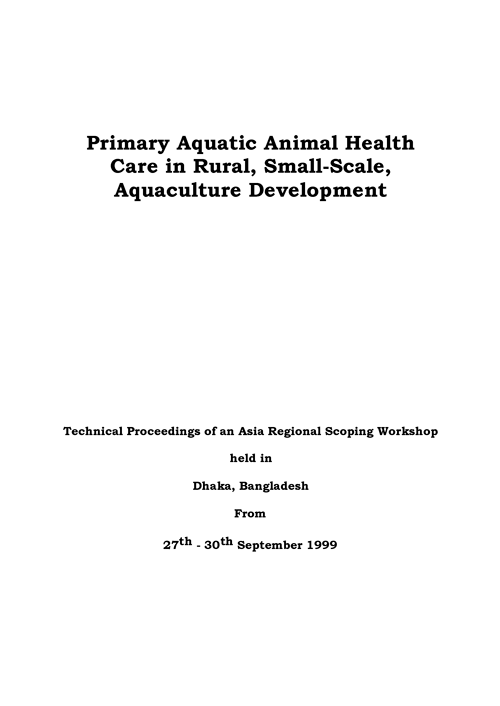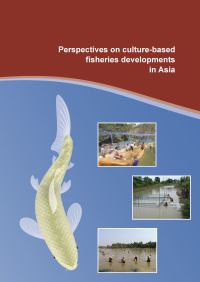Primary aquatic animal health care in rural, small-scale aquaculture development
3 June 2005 | 882 Downloads | .zip | 1.22 MB | Bangladesh, China, Culture-based fisheries, Freshwater finfish, Freshwater prawns, Health and Biosecurity, India, Lao PDR, Thailand, Vietnam
This document is the technical proceedings of the Asia Regional Scoping Workshop on “Primary Aquatic Animal Health Care in Rural, Small-scale, Aquaculture Development,” held in Dhaka, Bangladesh from 27 - 30 September 1999. The workshop was organised by the Department for International Development of the United Kingdom (DFID), the Food and Agriculture Organization of the United Nations (FAO) and the Network of Aquaculture Centres in Asia-Pacific (NACA), and hosted by the Ministry of Fisheries and Livestock of the Government of Bangladesh (GoB). The objectives of the workshop were twofold: (1) to review information on socio-economic impacts, risks of disease incursions and health management strategies in rural, small-scale aquaculture and enhanced fisheries programmes; and (2) to identify potential interventions for their better health management and appropriate followup actions. The workshop was attended by 48 participants from 12 countries and is complementary to efforts of FAO, NACA and others to assist countries within the Asian Region to develop effective policies and improve capacities to minimise the impacts of aquatic animal disease outbreaks. The workshop was preceded by several case studies in countries of the Asian Region that explored the social and economic impacts of aquatic animal disease on the livelihoods of people involved in small-scale aquaculture and enhanced fisheries. The workshop largely focused on understanding the impacts of aquatic animal health risks in small-scale rural, low-input aquaculture and enhanced fisheries and evaluating their impacts on rural livelihoods. The workshop also attempted to derive appropriate management interventions to deal with health risks within rural livelihood programmes involving aquaculture and enhanced fisheries.
The workshop was a unique event bringing together experienced aquatic animal health specialists, aquaculturists, sociologists, economists, extension specialists and rural development practitioners in the Asian Region. Although quantitatively estimating the overall impacts of disease on rural livelihoods was difficult due to lack of adequate socioeconomic information, the consensus among the workshop participants was that aquatic animal health problems are a risk to the livelihoods of people involved in small-scale aquaculture and enhanced fisheries in Asia. From the information derived from specific case studies, it was clear though that health problems impact on the livelihoods of rural, resource-poor aqua-farmers, fishers and their dependants, through loss of production, income and assets. A necessity to quantify better the livelihood impacts was clearly identified. The workshop agreed that the risks to sustainable livelihoods from the introduction of aquatic animal pathogens and health problems originate from several fundamental inadequacies, with lack of knowledge in understanding and managing risks being a major basis for concern. The workshop considered that health management interventions should be a component within programmes aimed at harnessing aquaculture's potential for rural development. It was also recognised that aquatic animal health problems in inland enhanced fisheries systems are often beyond the control of rural communities, making the livelihoods of rural poor most at risk when serious disease outbreaks occur.
Whilst the risks and impacts of disease in small-scale aquaculture and enhanced fisheries vary between countries and localities, and the management interventions for mitigation may differ, the workshop identified a number of strategies with the potential to reduce risks to livelihoods from such problems. This Technical Proceedings, including the case study papers, presentations, discussions and findings from the workshop, represents a valuable and unique collection of information on aquatic animal health in small-scale aquaculture and enhanced fisheries within the Asian Region.
Copyright, all rights reserved.

